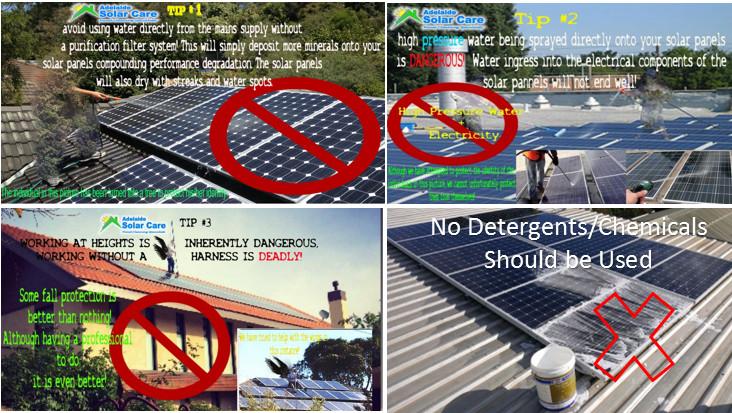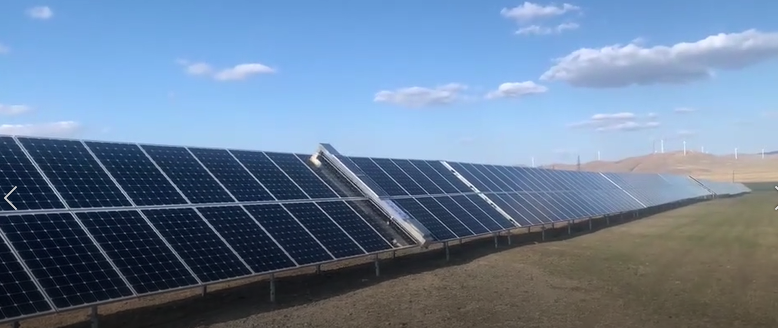Risks and Considerations in Solar Panel Cleaning
Cleaning solar panels is essential for maintaining their efficiency, but it can also pose significant risks to both the panels and the environment. Additionally, workers involved in cleaning solar panels face various potential dangers. Understanding these risks is crucial for implementing safe and effective cleaning practices. Below are the key dangers and considerations associated with solar panel cleaning.

Risks to Solar Panels
Physical Damage
Using high-pressure water or abrasive tools can cause various forms of physical damage to solar panels. Key concerns include:
Microcracks
The movement of cleaning robots across the solar panel surface can generate dynamic loads, leading to microcracks in the silicon cells. These microcracks can significantly degrade performance over time, with studies indicating a potential decrease in photovoltaic efficiency of around 20%.Water Impact
High-pressure water cleaning can induce mechanical stress on the panels. Additionally, water left on surfaces may form stains, adversely affecting the optical properties of glass, which can reduce light absorption and energy output.
Risks to the Environment
Water Usage
Frequent cleaning with water can result in excessive water consumption. For instance, a 200 MW photovoltaic power station in Guangxi, China, reportedly uses about 15,000 tons of water annually for cleaning.
Wastewater Pollution
Wastewater from cleaning operations can contain detergents and chemicals, leading to soil and water pollution if not managed properly. This pollution can have long-term environmental consequences, such as soil contamination and harm to aquatic ecosystems.
Chemical Residues
Cleaning agents often contain harmful chemicals such as surfactants and corrosion inhibitors. These substances can accumulate in soil, making it potentially toxic and unsuitable for agricultural use or other applications.
Health Risks
Risks Faced by Workers
In addition to environmental and panel risks, workers engaged in cleaning solar panels face various dangers:
High Altitude Work Risks
- Fall Accidents: Many solar panels are installed on rooftops or elevated structures. Without proper safety measures, such as harnesses, safety nets, and non-slip shoes, workers may be at risk of falls, leading to serious injuries or even fatalities.
- Equipment Failure: Using elevated work platforms or ladders poses fall risks if equipment is improperly maintained or misused.
Electrical Safety Risks
- Shock Hazards: Solar panels generate electricity in sunlight. If workers inadvertently contact live components during cleaning, the risk of electric shock increases, especially in wet conditions.
- Static Discharge: Static electricity generated during cleaning can pose hazards to both workers and solar panels. It’s essential for workers to wear anti-static clothing and use anti-static tools.
Chemical Exposure Risks
- Skin and Eye Irritation: Many cleaning agents contain strong alkaline or acidic components, which can irritate skin and eyes. Prolonged exposure may lead to chemical burns and other health issues.
- Respiratory Hazards: Some volatile cleaning agents may be inhaled during use, potentially harming the respiratory system. Chemicals containing organic solvents are particularly concerning, as long-term exposure may lead to chronic respiratory illnesses.
Physical Injury Risks
- Cuts and Scrapes: Using sharp cleaning tools can lead to cuts and abrasions if not handled carefully. This risk is heightened when dealing with built-up grime and stubborn stains.
- Overexertion: Frequent manual cleaning can lead to worker fatigue, particularly in extreme temperatures. This can adversely affect health, efficiency, and the quality of cleaning.
Environmental Condition Risks
- Extreme Weather: In sandy or desert regions, workers may encounter sandstorms, creating unsafe working conditions that can impede cleaning effectiveness and endanger worker safety.
- Temperature Extremes: Working in high or low temperatures can pose risks of heat stress or hypothermia. Proper scheduling of cleaning operations to avoid extreme conditions is critical.
Technological Solutions to Mitigate Risks
Self-Cleaning Coatings
Applying self-cleaning coatings, like titanium dioxide (TiO2), can reduce the need for frequent cleaning. These coatings enhance the hydrophilic and photocatalytic properties of glass, allowing rainwater to wash away dirt effectively.
Hydrophilic Properties
TiO2 coatings promote water spreading, forming a thin film that aids in effective cleaning and reduces water spots.Photocatalytic Decomposition
These coatings help decompose organic contaminants using UV light, diminishing the reliance on chemical cleaners.
Dry Cleaning Methods
Some cleaning robots utilize dry cleaning methods, such as brushing and blown air, which do not involve water or chemicals. This minimizes the risk of physical damage and environmental pollution.
Solar panel dry cleaning machine

Shock Absorbers
To lessen the impact of cleaning robots on solar panels, designs often incorporate shock absorbers. These devices mitigate the forces exerted by the robots and reduce the chance of microcracks or other damage.
Best Practices for Safe Cleaning
Regular Maintenance
Consistent maintenance of cleaning equipment is vital. This includes checking brush conditions, ensuring proper water pressure, and verifying vacuum system functionality.Use of Gentle Cleaning Agents
Selecting gentle, non-abrasive cleaning agents can minimize both physical damage and environmental impact. Favoring biodegradable and eco-friendly detergents is preferable.Proper Wastewater Management
Implementing filtration systems and chemical neutralization processes can help treat and manage wastewater, preventing contamination of soil and water.Training and Safety Protocols
Providing training for workers in the proper use of cleaning equipment and establishing safety protocols can reduce health risks and the likelihood of damaging the panels.
Specific Measures for Worker Safety
Safety Training
Conduct regular safety training sessions for workers, covering safe cleaning methods and operating procedures, including high-altitude safety, electrical safety, and chemical handling.Personal Protective Equipment (PPE)
Require workers to wear necessary PPE, such as helmets, harnesses, non-slip footwear, anti-static clothing, goggles, and masks, to significantly reduce injury and health risks.Equipment Inspection and Maintenance
Regularly inspect and maintain cleaning equipment to ensure it is in good working condition, particularly for high-altitude equipment and electrical tools.Work Schedule Management
Avoid cleaning in extreme weather, and optimize scheduling to ensure workers operate in favorable conditions, such as early morning or late evening to escape the heat.Emergency Preparedness
Develop emergency response plans that include first aid measures and evacuation procedures. Ensure the presence of adequate first-aid supplies and trained personnel on-site.
By understanding and addressing these risks, as well as implementing comprehensive safety measures for workers, the cleaning of solar panels can be made safer and more sustainable. This ultimately contributes to the longevity and efficiency of solar power systems while safeguarding the health and well-being of those involved in the cleaning process.